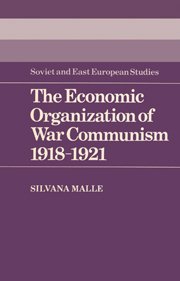Book contents
5 - Industrial administration
Published online by Cambridge University Press: 16 October 2009
Summary
THE SUPREME COUNCIL OF THE NATIONAL ECONOMY (VSNKH)
Several factors affected the process of forming Soviet economic institutions, the nature and function of which did not remain stable during war communism. Marxist ideology did not provide concrete guidance about economic organization, but it did provide a general hint about what had to be kept and what dropped on the path of economic development. This hint was not irrelevant in the selection of alternatives facing the leadership. There was no disagreement among Russian Marxists regarding the belief that socialism had to carry forward the latest achievements of capitalism. This peculiar form of determinism exerted an impact on the continuity of economic institutions and methods, which were the legacy of the Tsarist war economy to Soviet power. In a revolutionary process, however, continuity was inevitably challenged by change. Change was furthered by the outburst of social and individual demands, which the revolution heightened after the fall of the Tsarist regime, and by the conflicting interpretations given to the relative urgency of tackling immediate problems and to the choice of priorities.
Civil war and the foreign economic blockade added exogenous constraints limiting the possibility of a stable institutional framework, and jeopardized any consistent programme of economic reconstruction. These factors did not have equal and simultaneous effects on economic policy. They were, however, interwoven from the beginning to the end of the experience of war communism in such a way that the isolation of one single factor from the others would be misleading for an interpretation of the origin of the war communism experience as well as for an understanding of its non-linear evolution.
- Type
- Chapter
- Information
- The Economic Organization of War Communism 1918–1921 , pp. 202 - 292Publisher: Cambridge University PressPrint publication year: 1985

